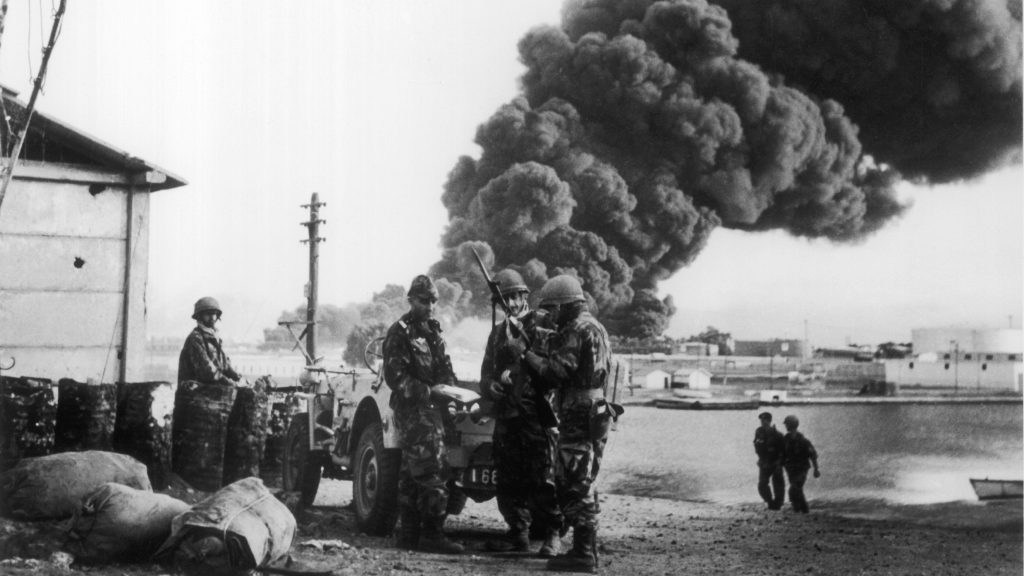On October 29, 1956, Israeli forces invaded the regions east of the Suez Canal, the Sinai Desert, and then the Gaza Strip, giving the British and French forces a pretext to join the war on October 31, 1956, in what was known as the tripartite aggression against Egypt, which succeeded in destroying the Egyptian Air Force .
The aggression came in implementation of political and military plans drawn up on October 22, 1956, during a secret meeting held in the town of Sèvres, France, between representatives of Britain, France, and Israel, to discuss ways to overthrow the rule of Egyptian President Gamal Abdel Nasser after he nationalized the Suez Canal.
Objectives of the tripartite aggression against Egypt
Each of these three parties (France, Britain, and Israel) had its own goal that it sought to achieve. Israel found in arming the Egyptian army a reason to upset the balance of power that existed at that time, and directing a strong strike against Egypt would lead to putting an end to the operations of the Palestinian guerrillas launched from the Gaza Strip. Gaza.
Before that, the Palestinian guerrillas continued their resistance, and in 1955 the Egyptian government supervised the training of guerrillas operating from the Gaza Strip and East Sinai, which greatly disturbed Tel Aviv and it sought to put an end to it.
The desire to punish the Fedayeen prompted Israel to begin planning an attack on Egypt. Egypt’s submission, which constituted the main point in the conflict, would lead to a broader regional surrender. It found an ally in France, which strongly sought to consolidate its relationship with Israel and take revenge on Egypt, which had supported the Algerian liberation revolution in 1954.
Israel also found an ally in Britain, which wanted to restore its previous position in Egypt before the revolution of July 23, 1952, after its long-term hegemony over Egypt was shaken with Gamal Abdel Nasser assuming power in 1952 and his nationalization of the Suez Canal Company in July 1956.
Causes of triple aggression
The reasons that led to this war can be divided into two parts: the direct reasons, which are those that were related to the start of military operations, and the historical reasons, which are the historical and geopolitical introductions or the main seeds that over time sprouted the firewood that ignited the “Suez War.”
The historical reasons
In 1854, former French diplomat Ferdinand de Lesseps convinced the governor of Egypt, Muhammad Said Pasha, to agree to the construction of a shipping canal across 100 miles of desert between the Mediterranean and Red Seas.
The canal was opened in November 1869, and France and Britain shared investment in it after Egypt sold its entire share to Britain.
Since that time, the Suez Canal has become the lifeline of the British Empire and connects London with its colonies in India and Asia, and protecting and securing it has become a strategic goal for all English leaders and commanders.
Britain succeeded in keeping the canal safe during World War I (1914-1918) and World War II (1939-1945).
In 1951, Mustafa El-Nahhas Pasha, leader of the newly elected Wafd Party, annulled the Anglo-Egyptian Treaty of 1936. This was quickly followed by attacks on the British garrison and riots in Cairo and throughout Egypt. The state of instability continued until July 1952, when King Farouk was overthrown by a group of The officers are led by Major General Muhammad Naguib.
In 1954, Gamal Abdel Nasser replaced General Naguib, and he had three goals: ending the British occupation, building Egyptian forces to attack Israel, and establishing the High Dam.
The United States retracted its pledges to help build the High Dam, the World Bank refused to contribute $200 million to its construction, and British Prime Minister Winston Churchill canceled an arms deal to Egypt, which prompted Abdel Nasser to arm the Egyptian army with Soviet weapons made in Czechoslovakia, which angered Nasser. The United States and the Western camp.
For direct reasons
On July 26, 1956, Egyptian President Gamal Abdel Nasser announced the nationalization of the Suez Canal Company, the joint British-French company that had owned and operated the Suez Canal since its inception in 1869.
Abdel Nasser’s announcement came months after escalating political tensions between Egypt, Britain, and France, and Egypt’s decision in August 1955 to close the Strait of Tiran at the Gulf of Aqaba to Israeli navigation.
The beginning of the war
On October 22, 1956, French Prime Minister Guy Mollet, British Prime Minister Anthony Eden, and Israeli Prime Minister David Ben-Gurion met in the town of Sèvres, near Paris, and concluded a secret agreement that Israel should attack Egypt, providing a pretext for an Anglo-French invasion of the Canal. Suez.
On October 29, 1956, the Israeli attack began with an air landing to control the Mitla Pass, and fierce fighting ensued. The next day, Britain and France issued an ultimatum to both sides to stop the fighting immediately.
On November 5, 1956, about 3 months and 10 days after Nasser nationalized the canal, the Anglo-French attack on Suez began, and was preceded by an air bombardment that led to the destruction and destruction of the Egyptian air force.
The most important battles and stations
The Israelis continued their operations, anticipating an Egyptian counterattack. Instead, Abdel Nasser’s army was withdrawing, and on the fifth and sixth of November 1956, British and French forces carried out two landing operations in Port Said and Port Fouad, and began occupying the canal area.
On the morning of November 6, 1956, the Soviet Union issued a strongly worded ultimatum to Britain and France, and it issued another ultimatum to Israel days later.
Fearing repercussions from the Soviet ultimatum, US President Dwight Eisenhower sent an ultimatum to Israel, France, and Britain calling on them to withdraw, forcing the aggressor countries to accept the international resolution and withdraw.
At midnight on November 6, 1956, a ceasefire was called at the insistence of United Nations Secretary-General Dag Hammarskjöld, and Security Council Resolution No. 1001 was issued stipulating a ceasefire.
Anglo-French forces had reached south of Port Said, but were not yet in control of the entire canal when they were stopped.
On December 22, 1956, the United Nations evacuated the British and French forces, and the Israeli forces withdrew in March 1957.
During the tripartite aggression against Egypt, great damage was caused to Port Said Governorate, located at the gate of the Suez Canal (Getty)
Human losses as a result of the tripartite aggression
There are no documented statistics about the loss of life on the Egyptian side or the invading forces, but press sources indicated that the losses of the British army amounted to 22 dead and 97 wounded, and on the French side the sources spoke of 10 dead and 33 wounded, and among the Israelis 172 dead and 817 wounded.
The aggression resulted in the killing of more than a thousand Egyptian civilians, while more than 1,650 soldiers were killed and 5,500 were captured.
The political consequences of the tripartite aggression
Politically, the intervention in Suez was disastrous and represented an official declaration of British imperialism’s abdication of world leadership and its retreat – along with France – to the back ranks, leaving the way for the United States to draw the global map again.
World public opinion – especially public opinion in the United States – coupled with the threat of Soviet intervention forced Britain, France and Israel to withdraw their forces from Egypt, and there was widespread anger in Britain itself.
Britain’s relationship with the United States weakened, and its influence in “East of Suez” diminished due to that adventure. In 1956, accusations of collusion between Britain, France, and Israel began to surface, but Anthony Eden denied this in Parliament and tried to avoid giving a conclusive answer.
On December 20, 1956, Eden delivered his final speech before the British House of Commons, in which he denied his prior knowledge that Israel was planning to attack Egypt. In January 1957, Eden’s health deteriorated and his political credibility was severely damaged, so he resigned from his position.
French Prime Minister Guy Mollet was subjected to severe criticism, and then his government collapsed in June 1957 due to the taxes he imposed to pay the price of the Algerian war.
As for Abdel Nasser, he emerged from the Suez crisis a moral victor and a champion of the cause of Arab and Egyptian nationalism. Israel did not gain freedom to use the canal, but it regained shipping rights in the Strait of Tiran, and Britain and France lost most of their influence in the Middle East as a result of this war.


